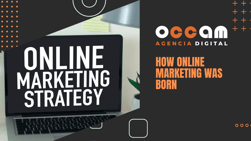Index Content
Mindful marketing is a new digital marketing trend based on the need to align with the values and needs of the audience. It has its origins in mindfulness, a relaxation technique from Eastern philosophy. It is used to focus energies on the present moment and understand our thoughts and emotions. Its aim is to overcome the stress and anxiety generated by certain situations. For this reason, for some years now, it has been incorporated into the business world. A good working environment ensures better results within the business.
The relationship between mindfulness and marketing arises from the intention of being present in work activities and connecting with the team. Through a series of techniques, the members of a company are conceived as necessary subjects to generate changes in society and not as robots. Mindful marketing is based on principles such as care for the environment, solidarity and equality. These are reflected in all stages of a marketing campaign. All elements are important, both the design and the words selected to promote an offer must be cohesive and reflect the values of the company. Besides creating a better work environment, this trend aims to connect with customers in a direct way. That is, it focuses on understanding their needs, concerns and desires, but also on knowing what their values are and offering a representation of these through the brand.
what is mindful marketing for?
- Generate a higher level of empathy: Understanding the needs, interests and principles of potential customers helps to empathise with them, and active listening is essential to gain their trust.
- Increase brand engagement: The marketing strategy will be directed towards customer expectations, leading to increased engagement with the public and company ambassadors.
- Build customer loyalty: By strengthening the bond between the customer and the company, a connection will be established. If nurtured, this will be long term and consumers will become loyal customers of the brand.
- Improve brand identity: The brand image will change and will be directly related to the values pursued, i.e. instead of thinking of a beauty products company, you will think of a company that sells cruelty free products.
- Humanise the company's business activities: Mindful marketing focuses on values, thus enhancing dialogue with customers and humanising business activities.
- Improving the working environment: This trend not only focuses on customers, but also on the relationships between team members and their comfort in the workplace.
- Stand out from the competition: The high level of competition in the sector makes it necessary for the company to differentiate itself through its principles.
5 key elements of mindful marketing
- Personalisation: This is the element that differentiates mindful marketing from other trends. The person is the protagonist of the strategies and the company's priority is to listen to what they have to say. The interest in the user's concerns and suggestions is essential to offer them the product they need. It is advisable to strengthen the communication channels to make the consumer feel part of the company.
- Problem solving: Mindful marketing always goes one step further, the aim is to find out the origin of the problems and find a solution to them.
- Content: It is not what is said, but how it is said. Focusing on the message is important in order to transmit the brand's values. Creative and approachable content is highly valued. Using techniques such as storytelling or copywriting helps to connect emotionally with the target audience.
- Transparency: Transparency defines mindful marketing. In order to offer customers an honest and quality service, the values and intentions of the brand must be disclosed, so that the user is free to decide whether he or she really wants to buy a product.
- Consciousness: By putting the focus on people, conscious consumption is promoted, which means that the customer must know what he or she is buying and what the company's social commitment is.
7 steps to incorporate mindful marketing in your company
1. Ask yourself what your purpose isTo implement mindful marketing in your company you should start by asking yourself why you need it. For a brand to be successful, it is important that it has a purpose beyond economic profit. To find out, you can ask yourself questions such as: What motivates me, who am I helping, what for, or why?
2. Define your company's valuesOnce you have gone through the first step, you will have a deeper understanding of what your company is all about. In order to develop your marketing plans, you need to define your values and principles and, together with your team, determine your brand's aspirations and actions.
3. Connect with your audiencePutting yourself in the customer's shoes and knowing what matters to them is fundamental to conscious marketing. In addition to creating a portrait of the buyer persona, you need to know their emotions. To achieve this, you need to know what they think or what their fears are. It is advisable to use an empathy map. These may vary depending on the industry, but they all serve the function of identifying what the market needs.
4. Promote a culture of corporate happinessMindful marketing starts within the company and extends to customers and suppliers. To have a positive impact on society, the people who work for our company must be happy and fulfilled. A culture of corporate happiness is based on engagement with the team. Initiatives such as teleworking, suggestion boxes and flexible working hours help employees to balance their personal and professional lives effectively and feel valued in their jobs.
5. Act with honestyTo connect with people, it is necessary to make your business project transparent. Consumers detect frauds and interests. Therefore, it is necessary to show that the brand is honest with its actions and has a human factor.
6. Meet expectationsMany companies defend values publicly, but do not get involved to eradicate them; they simply do it to have an impact. This happens, for example, in greenwashing. In the long term, these actions arouse distrust among consumers. It is necessary to participate in social causes and put your company's commitment into practice. Demonstrating that these are not just words will determine the future of the relationship with the brand's customers.
7. AnalyseFinally, it is worth reflecting on the marketing actions carried out. Knowing if mindful marketing has been beneficial for the company or if the brand values are aligned with our initial objectives will serve to optimise future campaigns.
3 companies that use mindful marketing
Lush Cosmetics: LushCosmetics is a great example of mindful marketing because when you hear about their products, respect for animals and the environment automatically comes to mind. This cosmetics company also focuses on its employees, seeking to ensure that they share the same values as the brand. To put mindful marketing into practice, they have developed charity campaigns such as the Charity Pot.
Ikea: The home furnishings company has an optimised sustainability programme. They use 100% sustainable cotton and natural fibres in all their products. They have thousands of environmentally friendly solutions and every year they add new ones to the list. Their goal is to have all their products made from recycled and renewable materials by 2030.
Natura: This fashion and accessories company focuses on selling products related to social responsibility. They follow values such as equality, care for the environment or the defence of animals. They put their commitment into practice by awarding an annual prize to projects that generate positive impacts. In addition, they allocate part of their income to finance them.






